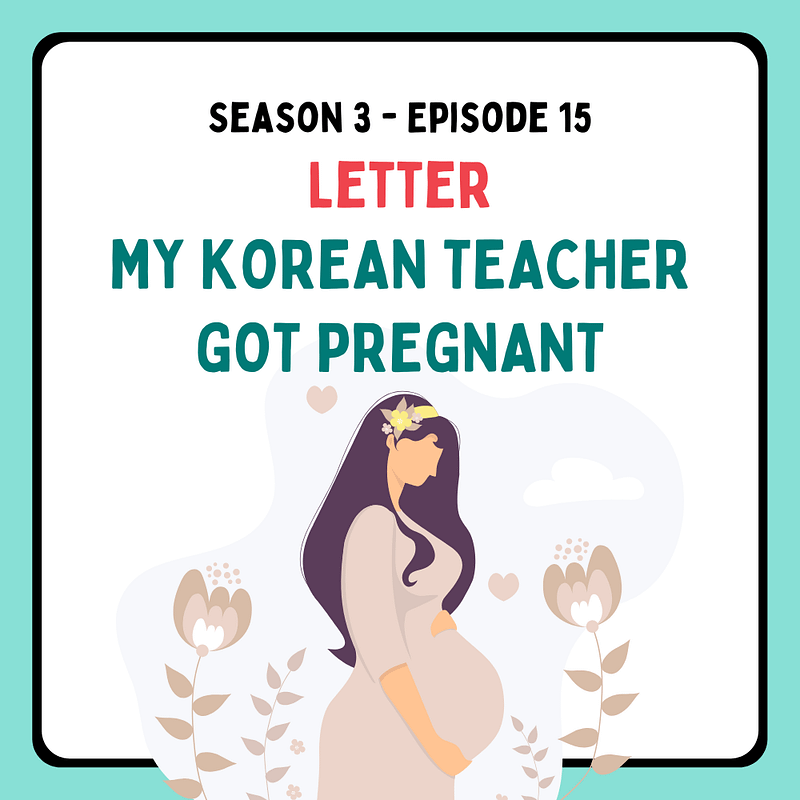Powered by RedCircle
시즌 3 15화. 우리 한국어 선생님이 임신을 했어요.
S3 EP15. My Korean teacher got pregnant.
안녕하세요? 여러분, 어떻게 지냈어요?
I’m your host, Vanessa, here at Korean Study Cafe Podcast.
Today we will listen to a letter from me announcing that I will take maternity leave for the next few months.
Then now, shall we listen to my letter for you? 그럼 여러분들에게 보내는 제 편지를 들어볼래요?
Script
Korean Study Cafe Podcast 청취자 여러분께
안녕하세요? 여러분. 바네사예요.
오늘은 여러분들에게 알리고 싶은 새로운 소식이 있어요. SNS에서는 이미 몇 번 말했지만 팟캐스트에서 처음으로 알리는 것 같아요.
네, 제가 임신을 했어요. 임신한 지 벌써 8개월이 넘었어요. 그래서 임신을 한 후 부터 일을 많이 할 수 없었어요. 왜냐하면 쉽게 피곤해져서 일에 집중하기 어려웠기 때문이에요. 그래서 수업도 덜 하고 SNS나 팟캐스트 활동도 덜 했어요.
그런데 이제 곧 제 출산 예정일이에요. 그래서 6월부터 10월 동안 팟캐스트를 매달 2번째 그리고 4번째 주 수요일에만 올릴 거예요. 그리고 SNS는 매주 수요일에만 올릴 거예요. 당분간 제가 자주 활동 못 하지만 Korean Study Cafe 팟캐스트를 계속 많이 들어주세요. 감사합니다.
Vanessa 드림
English Translation
Dear Korean study cafe podcast audience
Hello everyone. It’s Vanessa speaking.
Today I have news that I want to announce to you. I think it’s my first time to announce this on the podcast, even though I already have several times on social media.
Yes, I am pregnant. It has already been eight months of being pregnant. I wasn’t able to work much after being pregnant. Because I got easily tired, it was hard to concentrate on my work. So I had fewer classes and reduced social media and podcast activities.
My due date is just around the corner. I will upload podcasts on the second and fourth Wednesday of the month from June till October. Also, I will upload content on my social media every Wednesday. Even if I cannot be active as before, please continue to support and listen to Korean Study Café Podcast.
Thank you
Vanessa
어땠어요? How was it? 어느 정도 이해했어요? Have you understood it at a specific range? Even if you haven’t, it’s fine because we will see the meaning together now.
Then, let’s check out some useful vocabulary and expressions.
Korean Study Cafe Podcast 청취자 여러분께
안녕하세요? 여러분. 바네사예요.
오늘은 여러분들에게 알리고 싶은 새로운 소식이 있어요. SNS에서는 이미 몇 번 말했지만 팟캐스트에서 처음으로 알리는 것 같아요.
In English, we also start writing a letter saying “To someone” or “Dear someone,” right? So do we in Korean, too.
The word to start can be different depending on whether or not you want to use the honorific expressions for the letter receiver. If you write a letter to someone whom you need to show respect, then start saying with the person’s name + 께. Otherwise, if the receiver is just a friend or someone you are close to, then you can write your letter by saying “the person’s name + 에게” These two words mean the same, which means “to someone.” The forms are different because one 께 is an honorific word and the other 에게 is a general word to say the same meaning.
Also, in Korean, the letter is usually concluded by saying your name, which is the letter writer. But you have to add a word to say, “This person’s name is the writer.” So if the sentences in the letter are all honorific, then attach 드림 after your name, which means “giving or offering the letter.” For example, if your name is 박지민, then it will be 박지민 드림.
But if the letter’s receiver is not someone you have to speak to respectfully, then attach one of the subject marking particles 가. In this case, you don’t even have to write your full name. Just the first name itself is enough. For example, if your name doesn’t end with a Batchim, then it should be like 혜수가, 윤기가. But if your name ends with a Batchim like 지민 or 정국, then add 이가 instead of 가 like 지민+이가, 정국+이가.
In Korean, if someone is pretty close to you and the person’s name ends with a Batchim, in order to make the pronunciation easier, we usually add one more syllable like 이 or 아. 이 is used when you just say the person’s name when talking or writing like 지민이 or 정국이, and 아 is used when you call the person directly like 지민아, 정국아. If the person’s name doesn’t end with 받침, when you just talk or write, you don’t have to attach any extra syllable. But if you call the person directly, then you should attach 야 after the name like 혜수야, 윤기야.
So this is the standard way to write a proper letter in Korean. Did you get this?
All right, then now, let’s see the main vocabulary words used in this part, and then let’s see the next part
- 청취자 audience
- 알리다 to inform, to announce
- 새로운 new
- 소식 news
네, 제가 임신을 했어요. 임신한 지 벌써 8개월이 넘었어요. 그래서 임신을 한 후 부터 일을 많이 할 수 없었어요. 왜냐하면 쉽게 피곤해져서 일에 집중하기 어려웠기 때문이에요. 그래서 수업도 덜 하고 SNS나 팟캐스트 활동도 덜 했어요.
You might have a question after listening to this sentence, 임신한 지 벌써 8개월이 넘었어요. What is that? It’d be probably this. Have you ever wondered why Koreans sometimes say 월 and sometimes say 개월 or 달 when they mean “month”? I am sure you were confused because most of my students also asked the same question to me.
So in this part, let me explain the difference between 개월, 달, and 월.
개월 and 달 is a counting unit for a period of time, which in this case, is a month. That’s why 개월 was used in the sentence that we just heard together 임신한 지 벌써 8개월이 넘었어요. It’s already been eight months since I got pregnant. So, in other words, you can use 달 instead of 개월, too. Then the sentence will be like this. 임신한지 벌써 8달이 넘었어요.
But there’s a slight difference when reading. 개월 is the word from Chinese characters 한자(Hanja), so you have to read the number before the word 개월 with the Sino number system 일, 이, 삼, 사, 오, whereas 달 is a pure Korean word, so you have to read the number that is used with this word 달 with using the Native number system 하나, 둘, 셋, 넷, 다섯.
So if you want to say a period of a month in Korean, then it can be 1개월[일개월] or 1달[한달], or if you want to say a period of 5 months in Korean, it can be 5개월[오개월] or 5달[다섯달].
Did you get this? All right, Then what does 월 mean?
월 is used to indicate each month of a year. In English, each month has its own name, like January, February, or March, but in Korean, instead of naming each month, the number is used to name them, and here the word 월 is used. 1월[일월] January, 2월[이월] February, 3월[삼월] March, 4월[사월] April. Also, this word is sometimes used to mean “monthly.” For example, 월급 monthly salary, 월 이자 monthly interest, 월 계약 monthly contract, etc.
So, 이 단어들의 차이점 이해했어요? Did you get the difference between these three words? I hope my explanation was clear enough to make you understand this well.
All right, then now, let’s see the main vocabulary words used in this part, and then let’s see the next part
- 임신을 하다 to get/be pregnant
- 피곤해지다 to get tired
- 집중하다 to concentrate, to focus
- 덜 less
- 활동 activity
그런데 이제 곧 제 출산 예정일이에요. 그래서 6월부터 10월 동안은 팟캐스트를 매달 2번째 그리고 4번째 주 수요일에만 올릴 거예요. 그리고 SNS는 매주 수요일에만 올릴 거예요. 당분간 제가 자주 활동 못 하지만 Korean Study Cafe 팟캐스트 계속 많이 들어주세요. 감사합니다.
Vanessa 드림
In Korean, the word root that means “day” is 일, so many words include this word 일. Now that we know the meaning of the word root 일, shall we check out the other words, including this?
First, the word we heard in this part was 예정일, right. It means “due date” 예정 means “scheduled,” and 일 means “day,” so literally, it means “the scheduled day or date” the most natural translation in English should be “due date” or “estimated day.”
And the next one, including the word root 일 that we could hear in this part, was 수요일 Wednesday. 수 means “water,” 요 means “planet,” and the last syllable 일 means, as we already know, day, so the water planet here means “Mercury” because water is the symbol of Mercury. So actually, 수요일 means “Mercury day.”
There must be some audience who already know about this, but I’m just going to explain this to those who don’t know this yet. As you might guess already, each day of the week represents a planet of our galaxy in the Korean language. So 월요일 Monday is “Moon,” and 화요일 Tuesday is “Mars,” 수요일 Wednesday “Mercury” 목요일 Thursday “Jupiter” 금요일 Friday “Venus”, 토요일 Saturday “Saturn,” and lastly 일요일 Sunday represents “Sun.” These words for the days of the week in many languages are named after the galaxy’s planets. If you are interested in this, google whether or not your language is also the same case. In most cases, it would probably be.
All right, then the next word is 매일, which means “every day.” 매 means “every or each,” 일 means day, as we already know. So 매일 means “every day.”
And then, 일상, it means “daily, or daily life” 일 means day and 상 means always. So “always same day” which is “daily, or daily life” 일상
And 생일 means “birthday”; it means the same 생 birth and 일 day.
The next is 휴일, which means “day off” or “holiday.” This word focuses on the meaning of the day when you don’t have to work or study because it means 휴 rest 일 day, rest day.
And 일주일, it means “one week.” 일 means “one,” 주 means “week,” 일 means “day.” So 일주일 means “a week or one week.”
And lastly, 일기, which means “diary, journal” in English. It literally means 일 day 기 record, a day’s record so that it can be translated as a diary or journal in English.
Okay, Was it helpful to learn the new words, including the word root 일? then lastly, let’s also check out the helpful words used in this part.
- 출산 childbirth, delivery, labor, giving birth
- 매주 every week
- 당분간 for a while, for some time, for now
As I told you in the letter, I will upload podcast episodes on the second and the fourth Wednesday and social media content every Wednesday. Please note this and refer to your studying schedule. Thank you. 감사합니다.




